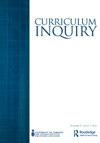Assemblages of nonreproductive spaces and some decolonial possibilities of schooling
IF 1.6
3区 教育学
Q2 EDUCATION & EDUCATIONAL RESEARCH
引用次数: 0
Abstract
Over forty years ago Curriculum Inquiry published Jean Anyon’s (1981) “Social Class and School Knowledge.” Anyon (1981), influenced by contemporary theories of social reproduction and other curriculum scholarship, employed a Marxist class analysis to examine working, middle, affluent, and elite classes of schooling to understand how the standard curriculum reproduces itself in and through its subjects. What Anyon (1981) learned was that the contradictions within and between social groups reproduced ideology but also resisted its reproduction. Anyon (1981) called this resistance to ideological and class reproduction nonreproductive possibilities and knowledge that “facilitates fundamental transformation of ideologies and practices” (p. 31). Anyon’s (1981) foundational work meant that no longer could schooling be the great equalizer if more knowledge is not the answer to increasing economic access. Anyon’s work influenced generations of scholars to question the values and value of schooling from within its contradictions towards more equitable futures through social change, a tradition that Curriculum Inquiry remains invested in and that the articles in this issue continue to examine. One recent work that draws briefly on Anyon’s (1981) work with the same spirit of interrogating schooling and social transformation, but from a decolonial ethic, is la paperson’s (2017) A Third University is Possible. For la paperson (2017), the university is a worlding or “world-making” (p. xiv) formation that consists of three entities. The first world university aims to actualize imperial colonial futures of a settled world. The second world university aims to humanize and include the world it had formerly excluded, but in the end, remains a colonial institution but will a gentle touch (i.e., liberal multiculturalism or settler reconciliation). Drawing on Deleuze and Guattari (1983), la paperson (2017) framed the third world university as a kind of desiring machine or a multiscalar assemblage driven by decolonial desires for Indigenous, Black, brown, and queer futures, the rematriation of land, and regenerating relationships broken through colonization and global, always racial, capitalism. Importantly, for la paperson (2017), colonial first and second world universities harbor antiand decolonial resistance. For example, drawing on postcolonial thinker and novelist Ngũgĩ wa Thiong’o, la paperson (2017) reminded readers that British colonial schooling in Kenya harbored to-be revolutionaries and the critical eye of Thiong’o himself. In other words, the first and second world colonial universities “carry decolonial riders ... [with]非生产性空间的集合和学校教育的一些非殖民化可能性
四十多年前,《课程探究》出版了Jean Anyon(1981)的《社会阶级与学校知识》。Anyon(1981)受当代社会再生产理论和其他课程研究的影响,采用马克思主义的阶级分析来考察学校的工薪阶层、中产阶级、富裕阶层和精英阶层,以了解标准课程如何在其主体中并通过其主体进行自我复制。Anyon(1981)的研究发现,社会群体内部和群体之间的矛盾在复制意识形态的同时,也在抵制意识形态的再生产。Anyon(1981)称这种对意识形态和阶级再生产的抵抗是非再生产的可能性和知识,“促进了意识形态和实践的根本转变”(第31页)。Anyon(1981)的基础性工作意味着,如果更多的知识不是增加经济机会的答案,学校教育就不再是伟大的均衡器。Anyon的工作影响了一代又一代的学者,他们从学校教育的矛盾中质疑学校教育的价值和价值,通过社会变革实现更公平的未来,这是《课程探究》一直致力于的传统,本期的文章也将继续研究这一传统。最近的一部作品是la paperson(2017)的《第三所大学是可能的》(a Third University is Possible),简要地借鉴了Anyon(1981)的作品,同样具有质疑学校教育和社会转型的精神,但从非殖民化的伦理出发。对于la paperson(2017)来说,大学是一个由三个实体组成的世界或“世界制造”(p. xiv)结构。第一所世界大学的目标是实现一个定居世界的帝国殖民未来。第二世界大学的目标是使它以前被排斥的世界人性化并包括在内,但最终仍然是一个殖民机构,但将采取温和的做法(即自由的多元文化主义或定居者和解)。la paperson(2017)借鉴德勒兹(Deleuze)和瓜塔里(Guattari)(1983)的观点,将第三世界大学描绘成一种欲望机器,或者是一种多标量的集合,由对土著、黑人、棕色人种和酷儿未来的非殖民化欲望驱动,土地的重新归化,以及通过殖民和全球(总是种族的)资本主义打破的关系的再生。重要的是,对于la paperson(2017)来说,殖民第一和第二世界的大学怀有反和非殖民化的抵抗。例如,la papererson(2017)以后殖民思想家和小说家Ngũgĩ wa Thiong 'o为例,提醒读者,肯尼亚的英国殖民教育窝藏着未来的革命者和Thiong 'o本人的批判眼光。换句话说,第一和第二世界的殖民大学“带着非殖民的骑手……(与)
本文章由计算机程序翻译,如有差异,请以英文原文为准。
求助全文
约1分钟内获得全文
求助全文
来源期刊

Curriculum Inquiry
EDUCATION & EDUCATIONAL RESEARCH-
CiteScore
3.10
自引率
17.60%
发文量
37
期刊介绍:
Curriculum Inquiry is dedicated to the study of educational research, development, evaluation, and theory. This leading international journal brings together influential academics and researchers from a variety of disciplines around the world to provide expert commentary and lively debate. Articles explore important ideas, issues, trends, and problems in education, and each issue also includes provocative and critically analytical editorials covering topics such as curriculum development, educational policy, and teacher education.
 求助内容:
求助内容: 应助结果提醒方式:
应助结果提醒方式:


